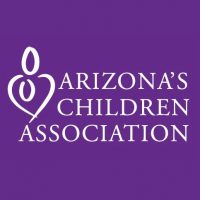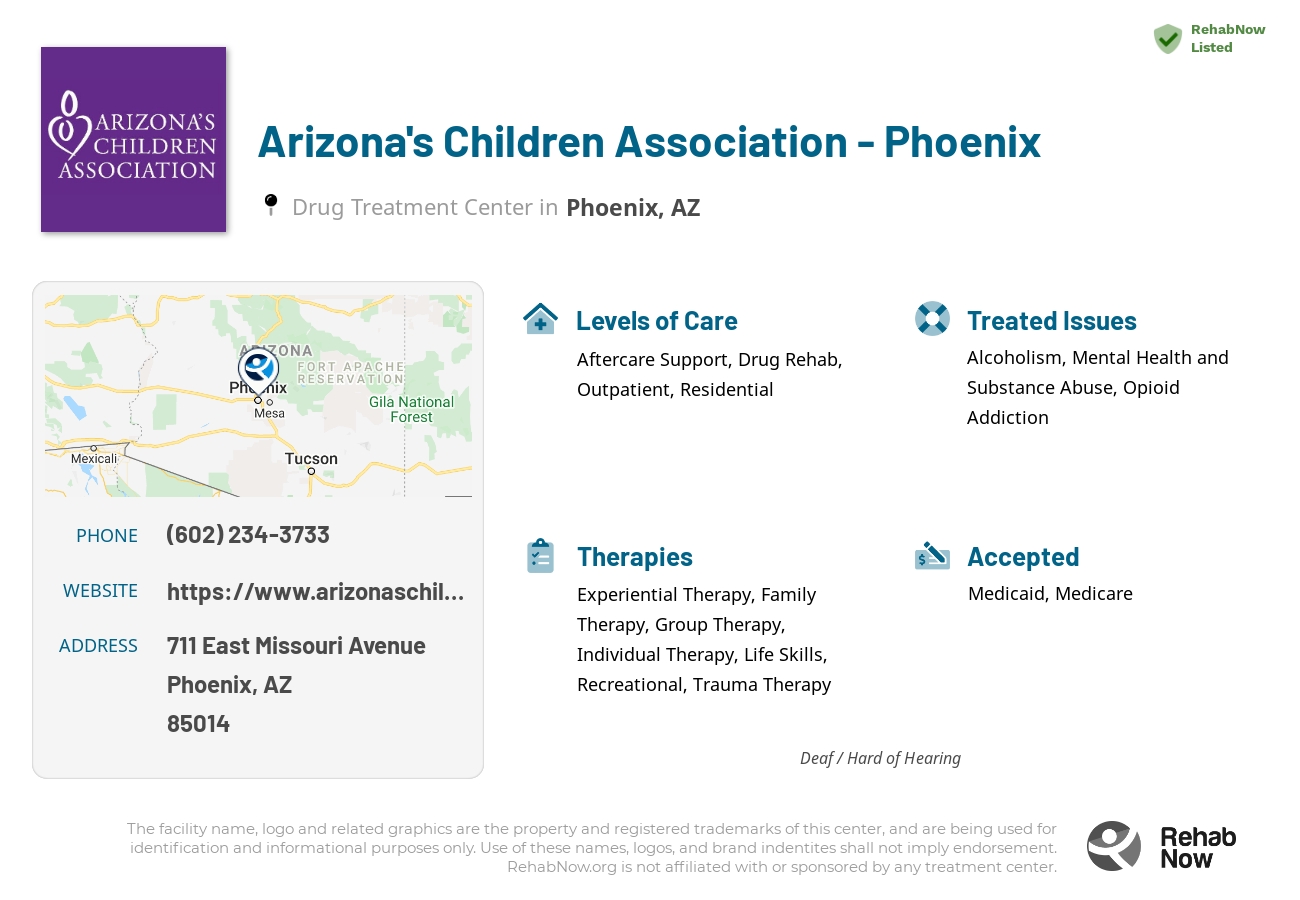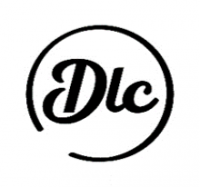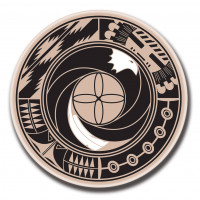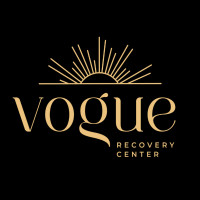Arizona's Children Association - Phoenix
Drug Rehab Center in Phoenix, Arizona
Arizona's Children Association in Phoenix offers comprehensive alcohol abuse, dual diagnosis, and opioid addiction treatments tailored to each patient, with a range of care programs and personalized services including therapy and life skills training.
About Arizona's Children Association - Phoenix in Arizona
Arizona's Children Association in Phoenix, Arizona, is a pivotal resource for children and families confronting the challenges of addiction. This facility stands out for its child welfare, behavioral health, and addiction recovery services tailored for individuals up to the age of 22. It emphasizes a trauma-informed approach and provides specialized services for those dealing with co-occurring addiction and mental health issues.
- Trauma-Informed Care: All staff are trained in understanding and addressing trauma, ensuring sensitive and effective treatment.
- Specialized Services for Youth and Families: Offers comprehensive recovery solutions including individual, group, and family counseling, suited for young adults and families.
- Neurosequential Model of Therapeutics (NMT): Utilizes an evidence-based, neurobiological approach to treatment, focusing on the brain's response to trauma.
Arizona’s Children Association is backed by a state license, highlighting its compliance with stringent standards and its dedication to delivering quality care. By accepting a wide array of private insurance plans and providing payment assistance, they make recovery accessible to a larger community.
Addressing alcohol abuse, dual diagnosis, and opioid addiction with a variety of treatments, the center emphasizes aftercare support, drug rehab, and both outpatient and residential programs. Through personalized care plans devised by licensed professionals, individuals are guided towards reclaiming control over their lives with methods including Experiential, Family, and Trauma Therapy among others.
Genders
Ages
Modality
Additional
Conditions and Issues Treated
Opioid addiction starts when a person becomes addicted to legal or illegal opioids. The addiction can happen quickly, in just a matter of days. Opioid withdrawal can be extremely uncomfortable and lead the user to continue to use even if they want to quit. Stopping using an opioid requires medical observation. Sometimes inpatient treatment with a medically supervised detox is necessary for managing the withdrawal process while learning lasting tools for maintaining recovery. Medications may be used in some cases of opioid addiction.
Opioid addiction is one of Arizona‘s most prominent forms of addiction. It’s treated by detoxifying the body so that the chemicals from the medications no longer impact them and by therapies to correct behavior and target the root of the problem.
Levels of Care Offered
This center offers a variety of custom treatment tailored to individual recovery. Currently available are Aftercare Support, Drug Rehab, Outpatient, Residential, with additional therapies available as listed below.
Outpatient treatment is considered the lower intensity level of addiction treatment. It’s ideal for early phase addiction or lower intensity addictions. It may include weekly sessions instead of daily. It may include weekly sessions instead of daily. Peer group support, 12-step programs, and individual counseling may still be involved but at a lesser frequency than an intensive outpatient program. It is a good choice for someone who doesn’t need to go through a medically supervised detox and who has a supportive home environment. It requires motivation and dedication to commit to the program without constant monitoring.
Residential treatment programs are those that offer housing and meals in addition to substance abuse treatment. Rehab facilities that offer residential treatment allow patients to focus solely on recovery, in an environment totally separate from their lives. Some rehab centers specialize in short-term residential treatment (a few days to a week or two), while others solely provide treatment on a long-term basis (several weeks to months). Some offer both, and tailor treatment to the patient’s individual requirements.
Aftercare support should take place after outpatient treatment has ended. There are a few different types of aftercare support that patients can seek. These include 12 Step, Self-help groups (AA, NA), Therapeutic communities, Long-term, structured sober living arrangements, and Halfway houses (residential treatment centers).
Therapies & Programs
Individual therapy involves one-on-one sessions between the patient and therapist. It provides patients with a safe environment to openly discuss personal and sensitive issues with the therapist. They find the therapist as someone they can trust. Individual therapy aims to identify the core issues that would have led the patient to substance abuse and address them effectively. The therapist can develop patient-specific customized solutions through individual therapy, which aids speedier recovery.
Family therapy is a group problem-solving that aims to improve communication and relationships between the addict, their family, and sometimes friends. The main goal of family therapy for drug addiction is to create an environment where communication can occur without judgment, hostility, or blame. The therapist is with the family as they learn to communicate differently, especially with the addict when s/he is using. The family can learn to reduce their enabling behavior or rally together and support each other during tough times.
An addict’s family can play a vital part in helping them to avoid relapse because they can spot the warning signs and help them get back on track before it becomes too much of a problem. Family therapy is one of the most effective ways to help addicts stay on the path to long-term sobriety. When a drug addict decides that they want to try and get sober, it takes the support of every person they love to succeed. It can be incredibly difficult for loved ones to watch an addict go through the pain and suffering of withdrawal, but by being there with them and supporting them, they can help to make sure that the addiction never returns.
Groups typically involve meetings with other recovering addicts who can relate to one another’s experiences. They might meet in person or online and typically focus on the process of staying sober rather than overcoming a specific addiction.
In these groups managed by Arizona's Children Association - Phoenix, addicts can build a sense of community and develop strong emotional connections with others who understand what they are going through. These beneficial relationships can help addicts overcome their cravings and prevent relapse at any point during the recovery process.
In general, trauma therapy is a clinical process that helps individuals deal with mental stress often caused by traumatic events. The therapist helps the person identify, understand, and work through the problem. This is done with the help of talking about it in group or one-on-one counseling sessions. Therapists use relaxation, role-playing, art, and music to help the person open up about what is bothering them.
There are many different types of trauma therapists, such as psychiatric nurses and counselors. Not everyone is a good candidate for this type of therapy; it is generally reserved for people who have recently experienced a traumatic event and struggle to get over it. It is often done for children, teenage victims of sexual assault, and war veterans.
Since addiction is a chronic physical and mental illness, addicts need to learn as many life skills as possible. Many drug treatment centers offer life skills activities as part of their addiction recovery programs. Examples include cooking classes, employment training, resume writing seminars, parenting classes, and computer training. Life skills activities help addicts find employment, take care of their families, and give back to the community.
Patient Experience
Experiential Therapy at Arizona's Children Association - Phoenix
Experiential Therapy teaches people how to think differently about their lives and change their emotions by changing their behavior. This type of treatment is accomplished with various activities that may involve acting, props, arts and crafts, animal care, or other tools that may be effective.
This therapy aims for patients to release suppressed thoughts that cause bad feelings and drug addiction. Role-playing, arts and crafts, music, animal care, rock climbing, etc., are some of the activities used in this therapy. Gradually an individual will feel calmer and more loving which will change their perception positively. In addition to treating drug addiction, experiential therapy is beneficial for different behavioral and eating disorders.
Payment Options Accepted
For specific insurance or payment methods please contact us.
Arizona’s Children Association Associated Centers
Discover treatment facilities under the same provider.
- Arizona's Children Association - Buckeye in Buckeye, AZ
- Arizona's Children Association - Yuma in Yuma, AZ
- Arizona's Children Association - Thomas Road in Phoenix, AZ
- Arizona's Children Association - Surprise in Surprise, AZ
- Arizona's Children Association - Apache Junction in Apache Junction, AZ
Learn More About Arizona’s Children Association Centers
Additional Details
Specifics, location, and helpful extra information.
Phoenix, Arizona 85014 Phone Number(602) 234-3733 Meta DetailsUpdated April 15, 2024
Staff Verified
Arizona's Children Association - Phoenix Patient Reviews
There are no reviews yet. Be the first one to write one.
Phoenix, Arizona Addiction Information
Arizona has some of the highest rates of prescription drug abuse in the United States. Methamphetamines, heroin and morphine are among the most commonly abused substances. Prescription pain relievers were prescribed to 348 million people in 2012, enough to medicate every adult in Arizona for 2 full weeks. The number of people with substance use disorders in Arizona has remained relatively constant over the past few years.
In 2012, over 246,000 people were living in Phoenix dependent on or abusing drugs. This amounted to 10.8% of the city's population. In 2016, over 1,000 emergency room visits related to heroin and over 2,500 for cocaine. These numbers are only going up. There are many different rehabilitation facilities in the city and some 12-step meetings and support groups available for help.
Treatment in Nearby Cities
- Tuba City, AZ (187.1 mi.)
- Florence, AZ (51.5 mi.)
- Globe, AZ (74.2 mi.)
- Litchfield Park, AZ (17.0 mi.)
- Tempe, AZ (9.5 mi.)
Centers near Arizona's Children Association - Phoenix
The facility name, logo and brand are the property and registered trademarks of Arizona's Children Association - Phoenix, and are being used for identification and informational purposes only. Use of these names, logos and brands shall not imply endorsement. RehabNow.org is not affiliated with or sponsored by Arizona's Children Association - Phoenix.
